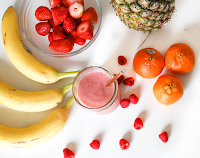Fruits : A Matching Exercise for Chinese Learners
If you're studying Chinese and looking to improve your vocabulary, we have a matching exercise that may interest you. It's both fun and challenging, so you won't have to search elsewhere. With this exercise, you can test your knowledge of Chinese fruit names and have a good time while doing it. Get ready to improve your language skills and quickly become a fruit expert. Let's get started!
A Matching Exercise
木瓜, 火龙果, 石榴, 芒果, 西瓜
李子, 苹果, 金桔, 草莓
柿子, 柠檬, 树莓, 香蕉, 桃子
菠萝, 梨子, 猕猴桃, 葡萄
黑莓, 蓝莓, 樱桃, 橙子, 橘子
李子, 苹果, 金桔, 草莓
柿子, 柠檬, 树莓, 香蕉, 桃子
菠萝, 梨子, 猕猴桃, 葡萄
黑莓, 蓝莓, 樱桃, 橙子, 橘子
SOLUTIONS
1. Kumquat (金桔 jīnjú)
2. Papaya (木瓜 mùguā)
3. Pear (梨子, lízi)
4. Tangerine (橘子 júzi)
5. Pomegranate (石榴 shíliú)
6. Lemon (柠檬, níngméng)
7. Apple (苹果 píngguǒ)
8. Pineapple (菠萝 bōluó)
9. Cherries (樱桃 yīngtáo)
10. Peaches (桃子 táozi)
11. Dragonfruit (火龙果 huǒlóngguǒ)
12. Blueberry (蓝莓, lánméi)
13. Oranges (橙子 chéngzi)
14. Grapes (葡萄 pútáo)
15. Persimmons (柿子 shìzi)
16. Strawberry (草莓, cǎoméi
17. Blackberry (黑莓, hēiméi)
18. Watermelon (西瓜 xīguā)
19. Kiwifruit (猕猴桃 míhóutáo)
20. Mangoes (芒果 mángguǒ)
21. Raspberry (树莓, shù méi)
22. Bananas (香蕉 xiāngjiāo)
23. Plums (李子 lǐzi)
* * *
Discover more puzzles in my book
Learning HSK Words with Puzzles: Level: HSK 1
This book is intended for those who want to practice basic Chinese characters as well as the pinyin of commonly used Chinese words. It contains a variety of puzzles and exercises that will help you improve your language skills.





Comments
Post a Comment